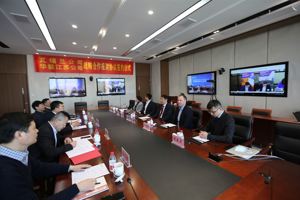Wärtsilä and Huaneng Jiangsu to develop sustainable power generation in China
The technology group Wärtsilä and Huaneng Jiangsu Co, the provincial subsidiary of China Huaneng Group Co., Ltd have signed a Strategic Cooperation Framework Agreement (Cooperation Agreement) to cooperate in the development of sustainable power generation in Jiangsu, China. The agreement was signed at the Huaneng Jiangsu company headquarters on 31 December 2020.
The aim of the Cooperation Agreement is to develop more sustainable and flexible power generation based on internal combustion engine (ICE) technology that would enable the integration of more renewable resources into the Jiangsu grid. This aligns with China’s energy security strategy of “four revolutions and one cooperation.” The strategy’s four revolutions are intended to curb energy consumption, establish a diversified energy supply system, upgrade energy technology, and speed energy sector development. The cooperation aspect refers to strengthening international cooperation to achieve energy security under open conditions.
At the signing ceremony Mr Cao Qingwei, Chairman of Huaneng Jiangsu Co, said: “I appreciate Wärtsilä’s willingness to cooperate and enhance EU-China cooperation on energy. This will help us to innovate and take advantage of market opportunities in ancillary services, such as frequency regulation and peak shaving in Jiangsu province. Implementation of ICE technology will help China to accelerate its transition towards clean energy.”
In response, Frederic Carron, Wärtsilä Energy’s Vice President Middle East and Asia, said: “Signing this Cooperation Agreement is of great significance to Wärtsilä. The development of cleaner and more sustainable power generation through the application of flexible ICE technology is a positive step. At Wärtsilä we look forward to working together with Huaneng Jiangsu to create both technological, economical, and social benefits.”
Wärtsilä’s long-term R&D commitment on improving combustion engine efficiency has resulted in Wärtsilä engines having the highest efficiency numbers among existing prime movers. A key success factor has been the development of integrated engine functionalities that enable low emissions, and high engine efficiency of up to 50 percent in single cycle mode, depending on the engine type.
EU and China share common interests and goals for the clean energy transition and are jointly responsible for one third of the world's primary energy consumption. The EU-China energy cooperation focuses on supporting global transition towards clean energy on the basis of a common vision of a sustainable, reliable and secure energy system.

- RWE strengthens partnerships with ADNOC and Masdar to enhance energy security in Germany and Europe
- TotalEnergies and Mozambique announce the full restart of the $20-B Mozambique LNG project
- Venture Global wins LNG arbitration case brought by Spain's Repsol
- KBR awarded FEED for Coastal Bend LNG project
- Norway pipeline gas export down 2.3% in 2025, seen steady this year




Comments